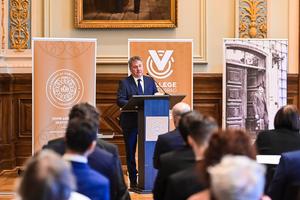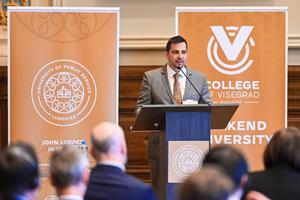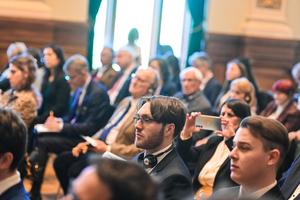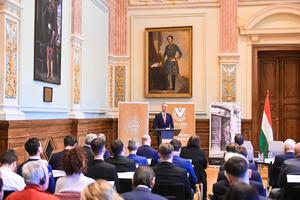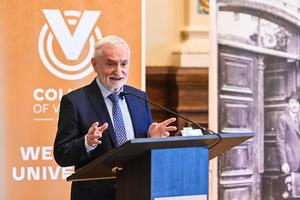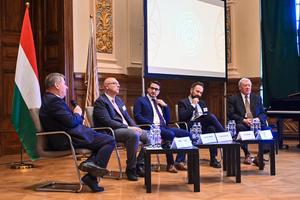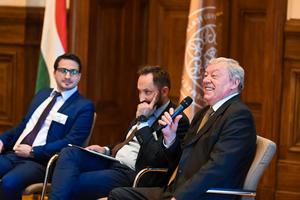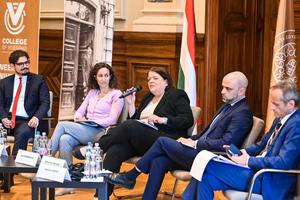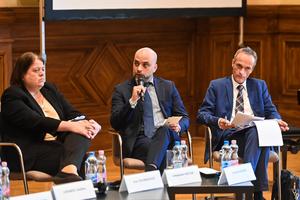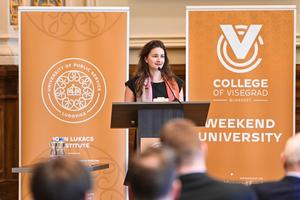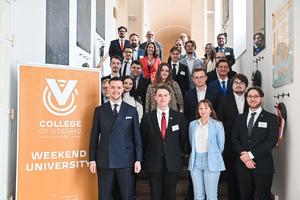"The importance of thinking collectively about Central Europe and cooperation between nations is more emphasised than ever," stated Gergely Deli, the Rector of Ludovika University of Public Service, at the opening event of the College of Visegrad+ Weekend University on April 4th at the university's Széchenyi Hall. The conference discussed how Visegrad cooperation is as important today as it was 700, 33, or 20 years ago, as regional collaboration among EU member states can contribute to collective advocacy. However, recent times have posed challenges to Visegrad cooperation, making it even more crucial to look towards the future. The aim of the College of Visegrad+ Weekend University program is to bring the youth of the four countries closer together, thereby promoting constructive dialogue.
"The significance of V4 cooperation is undeniable," emphasised Gergely Deli in his opening speech. He highlighted that the Ludovika University of Public Service has organised numerous conferences on the topic in recent years. He mentioned that Ludovika had established international partnerships with 15 universities in Visegrad countries based on cooperation agreements, and the university is also a cooperating institution of "Think Visegrad," the knowledge centre network of V4 countries, which provides a platform for discussing strategically critical regional issues.
Gergely Prőhle, the Program Director of the John Lukacs Institute at Ludovika University of Public Service and Director of the Habsburg Otto Foundation, as the event's coordinator, recalled that cooperation among Visegrad countries was once just a dream during communism. Still, after regime changes, it evolved into a strong network, one form of which is the V4.
Márton Ugrósdy, Deputy State Secretary at the Political Directorate of the Prime Minister's Office, pointed out that Central European identity has an ideological and philosophical context. He emphasised that the region's geographical location, between East and West, dramatically influences its political attitudes. He said that the V4's common identity is primarily shaped by centuries of struggles for independence. He added that the ongoing war in Ukraine poses a challenge to cooperation.
Petr Mareš, Executive Director of the International Visegrad Fund, stressed the importance of remembrance. Although he believes that the current perspective on cooperation may not be as bright, despite voices in the Czech Republic or Poland claiming that Visegrad cooperation is dead, he sees no cause for concern. He reminded us that in 1999, changes occurred across Europe, opportunities for cooperation opened up, and V4 countries realised that they were close to each other and cooperation was much better.
The first roundtable discussion after the speeches delved into the topic of Visegrad cooperation at the turn of the 20th and 21st centuries. Ladislav Cabada, Vice-Rector of Metropolitan University Prague, discussed how V4 cooperation influences young generations. He said that the relationship between educators and students plays a significant role in Czech culture and politics, and they are committed to Central European cooperation.
Marcel Dolobáč, Vice-Dean of the Faculty of Law at Pavol Jozef Šafárik University in Slovakia, emphasised that unity in diversity should be upheld in this case as well. He believes that celebrating common heritage generates optimistic thoughts and builds bridges to the future. Piotr Szwedo, Director of the OKSPO Center for Foreign Law Schools in Poland, stressed the need for more university and institutional cooperation to think ahead 20-30 years.
Iván Bába, former State Secretary for Public Administration at the Ministry of Foreign Affairs, spoke about his personal experiences as a former ambassador to Warsaw from the pre-transition period when Central Europe was still just a dream. He emphasised that the four countries share a common destiny, roots, and identity.
The ambassadorial roundtable, moderated by Dénes András Nagy, coordinator of the College of Visegrad+ program, focused on the future of V4. Eva Dvořáková, Ambassador of the Czech Republic to Hungary, believes that although cooperation among neighbouring countries has not been easy throughout history, the legacy of Václav Havel and József Antall is exemplary. She emphasised that exchange programs, cross-border collaboration, and support for educators are essential for strengthening the region's internal cohesion. Gabriel Szőke, Head of the V4 Department at the Ministry of Foreign Affairs and European Affairs of the Slovak Republic, highlighted the enormous achievements of collaboration over the past 33 years despite different backgrounds.
Sebastian Kęciek, Ambassador of Poland to Hungary, emphasised the great need for the four countries to remain united, cooperate in various areas, and continue building the Central European region together.
Representing the Ministry of Foreign Affairs and Trade in developing European relations, Zsófia Légrádi and Krisztina Varju highlighted the importance of establishing standard policies related to sovereignty and competitiveness, including agriculture.
In her closing speech, Liliana Śmiech, the International Director of Ludovika University of Public Service, stated that the opening event of the College of Visegrad+ Weekend University is a lesson on the importance of cooperation and the need to build our relationships within the region continuously. She added: "It is inevitable that we equip future generations with this responsibility. This will be the mission of the College of Visegrad."
Text: Harangozó Éva
Photo: Szilágyi Dénes
